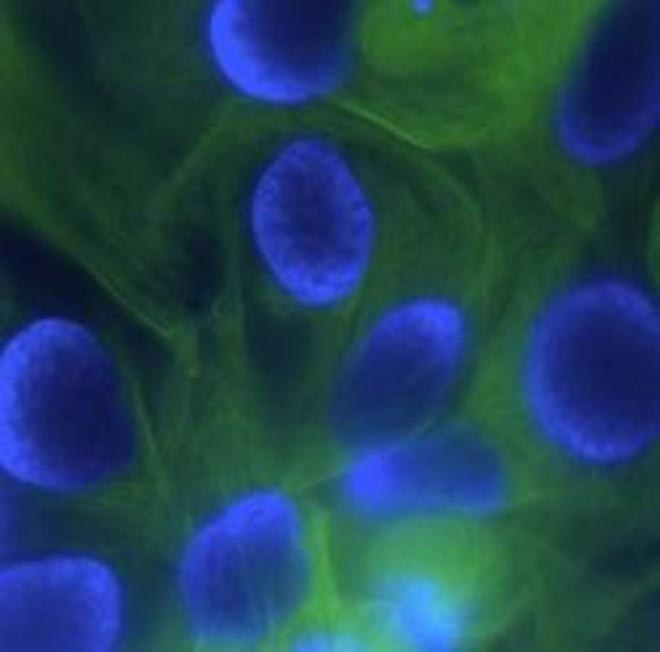There were fresh hopes on Thursday of beating cancer with the news that two British scientists had identified the genetic code of two of the most deadly cancers, Xinhua reported..
The breakthrough could mean a revolution in cancer treatment with the possibility that each cancer patient's treatment could be personalized, with the pattern of mutations being used to tailor an individual treatment for each person.
The feat, the comprehensive analysis of two cancer genomes (the hereditary information which is encoded in DNA), is a world first and is a revolutionary breakthrough.
All cancers are caused by mutations in the DNA of cancer cells which are acquired during a person's lifetime. The studies, of a malignant melanoma and a lung cancer, reveal for the first time essentially all the mutations in the genomes of two cancers.
Lung cancer causes around 1 million deaths worldwide each year: almost all are associated with smoking. The number of mutations found suggest that a typical smoker would acquire one mutation for every 15 cigarettes smoked. Although malignant melanoma comprises only 3 percent of skin cancer cases, it is the cause of three out of four skin cancer deaths. The melanoma genome contained more than 30,000 mutations that carried a record of how and when they occurred during the patient's life.
The scientists studied the cancers in two patients. The first was a man, aged 55, with small cell lung cancer and the second, a 45-year-old man with a malignant melanoma, a type of skin cancer. The results were published in the scientific journal Nature.
Scientists used genetic sequencing machines to read the full genomes of both the cancer cells and healthy tissues.
Professor Mike Stratton, from the Cancer Genome Project at the Wellcome Trust Sanger Institute near Cambridge in Eastern England, led the research team.
"These are the two main cancers in the developed world for which we know the primary exposure," said Stratton.
For lung cancer, it is cigarette smoke and for malignant melanoma it is exposure to sunlight. With these genome sequences, we have been able to explore deep into the past of each tumor, uncovering with remarkable clarity the imprints of these environmental mutagens on DNA, which occurred years before the tumor became apparent.
"We can also see the desperate attempts of our genome to defend itself against the damage wreaked by the chemicals in cigarette smoke or the damage from ultraviolet radiation. Our cells fight back furiously to repair the damage, but frequently lose that fight."
The studies used powerful new DNA sequencing technologies to decode completely the genome of both tumor tissue and normal tissue from a lung cancer and a malignant melanoma patient.
By comparing the genome sequence from the cancer to the genome from healthy tissue they could pick up the changes specific to the cancer. The studies are the first to produce comprehensive genome- wide descriptions of all classes of mutation, producing rich accounts of the genetic changes in the development of the two cancers.
Dr Peter Campbell from the institute said: "The knowledge we extract over the next few years will have major implications for treatment. By identifying all the cancer genes we will be able to develop new drugs that target the specific mutated genes and work out which patients will benefit from these novel treatments."
Sir Mark Walport, director of the Wellcome Trust said: "We want to drive healthcare through better understanding of the biology of disease.
"Previous outcomes from our Cancer Genome Project are already being fed into clinical trials, and these remarkable new studies further emphasize the extraordinary scientific insights and benefits for patients that accrue from studying the genome of cancer cells.
"This is the first glimpse of the future of cancer medicine, not only in the laboratory, but eventually in the clinic. The findings from today will feed into knowledge, methods and practice in patient care."
Stratton is deputy director of the Wellcome Trust Sanger Institute, where he is joint head of the Cancer Genome Project. he is also professor of Cancer Genetics at the Institute of Cancer Research.
He qualified in medicine at Oxford University and Guys Hospital in London, trained as a histopathologist at the Hammersmith and Maudsley Hospitals, also in London, and obtained a PhD in the molecular biology of cancer at the Institute of Cancer Research.
His research interests have been in the genetics of cancer. He led the group that mapped and identified the high risk breast cancer susceptibility gene, BRCA2.
More recently he has found moderate risk breast cancer susceptibility genes as well as genes for skin, testis, colorectal, thyroid, and childhood cancers.
At the Cancer Genome Project he conducts high throughput, systematic genome wide searches for somatic mutations in human cancer in order to identify new cancer genes, to understand processes of mutagenesis in human cancers and to reveal the role of genome structure in determining abnormalities of cancer genomes.
He was elected a Fellow of the Royal Society, Britain's national academy of science, in 2008.
The Wellcome Trust Sanger Institute is a leader in the 12-year Human genome project, and has built on its sequencing skills to develop new programs in postgenomic biology -- understanding the messages in genes. The institute aims to maintain a position at the forefront of experimental and computational genome research.
The institute's research projects fall into four main areas of research -- human genetics, mouse and zebrafish genetics, pathogen genetics and bioinformatics.
The institute was founded in 1993, and has taken part in some of the most important advances in genomic research, developing new understanding of genomes and their role in biology.






